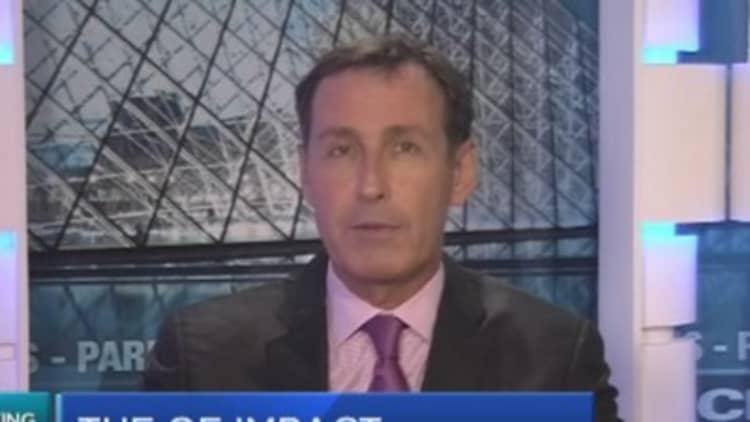While European Central Bank (ECB) President Mario Draghi would probably quite like to declare his large-scale asset purchase program a success, he will likely strike a balance between optimism and caution on Wednesday.
While soft economic indicators are improving, the real economy has yet to pick up the same steam. As such, Draghi will want to avoid leaving any room for a discussion about tapering at the central bank meeting, only one month into its quantitative easing (QE) program.

"It would be the easiest for him to declare victory again as he did in Cyprus last month, but he needs to be cautious to rather do that in private and not in front of too many TV cameras," Carsten Brzeski, chief economist at ING Germany, said in a recent phone interview with CNBC.
"If things seem to be too good now, QE sceptics inside the ECB will step out and start the tapering discussion very soon."
The ECB started buying government debt on March 9, bringing life to its 1.1 trillion-euro ($1.2 trillion) QE program announced back in January.
At the bank's March meeting in Cyprus, Draghi declared victory. It's a view backed by economists polled by Reuters, with three quarters saying the ECB was "about right" in claiming the program was having a positive impact before it had even begun.
ECB Executive Board Member, Yves Mersch, addressed the issue in an interview with German newspaper Boersen-Zeitung last week. He insisted that if inflation expectations grew faster than expected towards the ECB's target of below-but-close-to 2 percent, the QE program could be stopped earlier than planned, which is September 2016.
That, of course, adds fuel to the discussion of a potential early tapering of the ECB's program and indicates a rift inside the governing council.
"On Wednesday, Draghi will try to pare down the comments made by Mersch and to stop the tapering discussion," Stefan Schneider, chief German economist at Deutsche Bank, said in a phone interview with CNBC Monday.
"He will want to convey the message that a first assessment is not possible before the beginning of next year at the earliest."
It comes after recent Purchasing Managers' Index (PMI) data for the euro zone from Markit showed an continued improvement in March, despite it not being evenly positive for each member country.
Read MoreEuro zone business activity shoots up
While Spain, Ireland and Germany are doing well, others, like France and Italy, did show more "modest" figures, according to Markit.

"Whether the euro zone economy has achieved escape velocity to enjoy a return to a strong and sustainable recovery remains uncertain, but the region is certainly seeing its best growth momentum since 2011", Chris Williamson, chief economist at Markit, said in a press release accompanying the data on April 7.
Recent inflation data also suggest that the deflationary pressure is easing, with prices in March falling by 0.1 percent year-on-year, after a drop of 0.3 percent in February and 0.6 percent in January.
Read MoreEurozone deflation eases further as QE takes hold
The euro has fallen 8.7 percent against the dollar since the announcement of QE in January, which is helping the fragile recovery.
"The lower euro is helping some of Germany's neighbours to grow a bit more than before, but that is all only a first improvement. The euro zone will grow below potential this and next year," Schneider added.
But as bond yields fall further in the euro zone, the discussion will most likely also hit on a potential shortage of "eligible" bonds for the ECB to buy.
The 10-year German Bund is close to trading with negative yields, and the ECB has said it will not buy sovereign debt which has a yield below its -0.20 percent deposit rate.
For now, though, things look relaxed.
"The ECB has clearly set a price limit with the deposit rate, but what has suprised me is that they have not bought into the longer end of the curve when it comes to German bunds," Christian Schulz of Berenberg Bank told CNBC.


